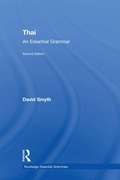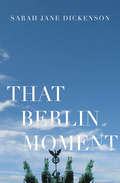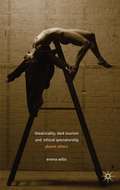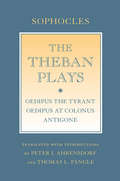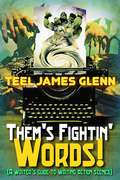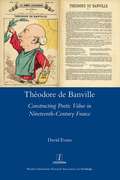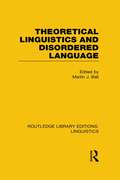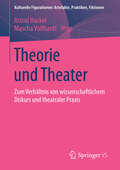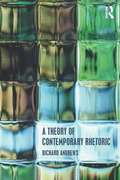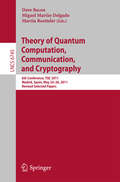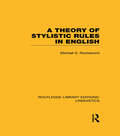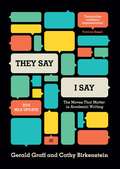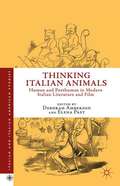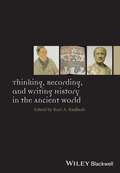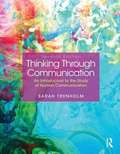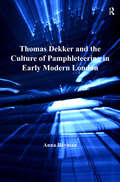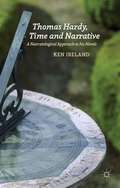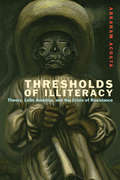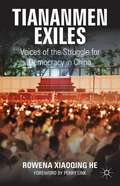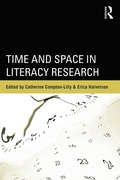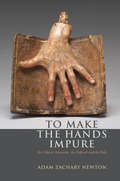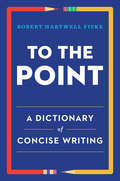- Table View
- List View
The Textualization of the Greek Alphabet
by Roger D. Woodard David A. ScottIn this book, Roger D. Woodard argues that when the Greeks first began to use the alphabet, they viewed themselves as participants in a performance phenomenon conceptually modeled on the performances of the oral poets. Since a time older than Greek antiquity, the oral poets of Indo-European tradition had been called 'weavers of words' - their extemporaneous performance of poetry was 'word weaving'. With the arrival of the new technology of the alphabet and the onset of Greek literacy, the very act of producing written symbols was interpreted as a comparable performance activity, albeit one in which almost everyone could participate, not only the select few. It was this new conceptualization of and participation in performance activity by the masses that eventually, or perhaps quickly, resulted in the demise of oral composition in performance in Greece. In conjunction with this investigation, Woodard analyzes a set of copper plaques inscribed with repeated alphabetic series and a line of what he interprets to be text, which attests to this archaic Greek conceptualization of the performance of symbol crafting.
Thai: An Essential Grammar (Routledge Essential Grammars)
by David SmythThis second edition of Thai: An Essential Grammar provides an up-to-date and concise reference guide to Thai grammar. Using clear, jargon-free explanations, it sets out the complexities of Thai in short, readable sections and presents an accessible description of the language. Focus is kept on the real patterns of use today and grammar forms are demonstrated through a wide range of relevant examples. No prior knowledge is assumed on the part of the reader. Features include: Coverage of crucial topics, such as sentence particles, negation, questions and quantification Examples given in both Thai script and romanised transliteration Pronunciation section Guidance on speech conventions and the Thai writing system Glossary of grammatical terms Two appendices covering Romanisation systems and three key verbs Bibliography This unique reference work will prove invaluable to all learners looking to master the grammar of Thai. It is ideal either for independent study or for students in schools, colleges, universities and adult classes of all types.
That Berlin Moment
by Sarah Jane DickensonBold, challenging and compelling That Berlin Moment is a play for four adult characters, two female and two male, which explores how memory is more about the present and the future than the past. 'Why don't I feel husband? I look at you and I don't feel husband, I smell you and I don't smell husband, I look at you and I -' A tragic accident has robbed Alex of her memory. Her attentive husband is eager to fill the gaps for her. But the more he tells her the more she hates who he tells her she is. Determined not to remember at all costs and with the help of a young doctor with a head full of maverick theories and a very new stethoscope, she agrees to meet the mysterious fellow patient, Stranger. Together they begin to explore and enjoy the present, but it soon becomes clear that his memories won't stay forgotten with terrifying consequences for both them and the Doctor.
Theatricality, Dark Tourism and Ethical Spectatorship
by Emma WillisTheatricality, Dark Tourism and Ethical Spectatorship: Absent Others builds upon recent literature concerning theatre and ethics and offers a uniquely interdisciplinary approach. With a focus on spectatorship, the book brings together analysis of dark tourism – travel to sites of death and disaster – and theatrical performances. At dark tourism sites, objects and architecture are often personified, imagined to speak on behalf of absent victims. Spectatorsare drawn into this dialogical scenario in that they are asked to 'hear' the voices of the dead. Theatrical performances that depict grievous histories often gain power through paradoxically demonstrating the limits of their representational ability: spectators are asked to attune themselves to absences and incomprehensibilities. This study asks whether playing the part of the listener can be understood in ethical terms. Sites surveyed span a broad geographical scope – Germany, Poland, Vietnam, Cambodia, New Zealand and Rwanda – and are brought into contrast with performances including: Jerzy Grotowski's Akropolis, Catherine Filloux's Photographs from S21, Adrienne Kennedy's An Evening with Dead Essex and Erik Ehn's Maria Kizito.
The Theban Plays: "Oedipus the Tyrant"; "Oedipus at Colonus"; "Antigone"
by Sophocles Peter J. Ahrensdorf Thomas L. PangleThe timeless Theban tragedies of Sophocles--Oedipus the Tyrant, Oedipus at Colonus, and Antigone--have fascinated and moved audiences and readers across the ages with their haunting plots and their unforgettable heroes and heroines. Now, following the best texts faithfully, and translating the key moral, religious, and political terminology of the plays accurately and consistently, Peter J. Ahrensdorf and Thomas L. Pangle allow contemporary readers to study the most literally exact reproductions of precisely what Sophocles wrote, rendered in readily comprehensible English.These translations enable readers to engage the Theban plays of Sophocles in their full, authentic complexity, and to study with precision the plays' profound and enduring human questions. In the preface, notes to the plays, and introductions, Ahrensdorf and Pangle supply critical historical, mythic, and linguistic background information, and highlight the moral, religious, political, philosophic, and psychological questions at the heart of each of the plays. Even readers unfamiliar with Greek drama will find what they need to experience, reflect on, and enjoy these towering works of classical literature.
Them's Fightin' Words
by Teel James GlennJoin professional fight choreographer Teel James Glenn as he takes you on a journey through the process of creating believable and dramatic action scenes in every kind offiction. Using wit and personal experience, he dissects action scenes for the keys to what makes them work. Readers benefit from his combat experience, including eastern martial arts, the physiology and kinetics of weight training and the dramatic story telling from film and stage acting. From fantasy swordfights, barroom brawls, comic combat to martial arts knockabouts, he not only outlines and explains the whys and wherefores of literary violence, he also explores techniques that allow you to create them yourself with a series of fun and easy to do exercises. He takes the mystery out of writing action, but not the excitement!
Theodore De Banville: Constructing Poetic Value in Nineteenth-century France
by David EvansTheodore de Banville (1823-1891) was a prolific poet, dramatist, critic and prose fiction writer whose significant contribution to poetic and aesthetic debates in nineteenth-century France has long been overlooked. Despite his profound influence on major writers such as Baudelaire, Rimbaud, Verlaine and Mallarme, Banville polarised critical opinion throughout his fifty-year career. While supporters championed him as a virtuoso of French verse, many critics dismissed his formal pyrotechnics, effervescent rhythms and extravagant rhymes as mere clowning. This book explores how Banville's remarkably coherent body of verse theory and practice, full of provocative energy and mischievous humour, shaped debates about poetic value and how to identify it during a period of aesthetic uncertainty caused by diverse social, economic, political and artistic factors. It features a detailed new reading of Banville's most infamous and misunderstood text, the Petit Traitede poesie francaise, as well as extended analyses of verse collections such as Les Stalactites, Odes funambulesques, Les Exiles, Trente-six Ballades and Rondels, illuminated by wide reference to Banville's plays, fiction and journalism. Evans elucidates not only aesthetic tensions at the heart of nineteenth-century French verse, but also a centuries-old tension between verse mechanisms and an unquantifiable, mysterious and elusive poeticity which emerges as one of the defining narratives of poetic value from the Middle Ages, via the Grands Rhetoriqueurs and Dada, to the experiments of the OuLiPo and beyond.
Theoretical Linguistics and Disordered Language: Linguistics: Theoretical Linguistics And Disordered Language (Routledge Library Editions: Linguistics)
by Martin J. BallThe rapid increase of interest in disordered speech and language among linguists over the past decade or so has resulted in many books of practical help to speech pathologists in terms of assessment and remediation. Little, however, has appeared to examine the theoretical implications of the interaction between these two fields. This book aims to fill this gap, by showing how speech pathology can inform linguistic theory and vice versa.
Theorie und Theater
by Astrid Hackel Mascha VollhardtDie Theaterwissenschaft beruft sich gern auf den gemeinsamen Ursprung von Theorie und Theater. Ein Grund zu fragen, auf welche Weise akademische Diskurse Eingang in zeitgenössische Performances, Tanz- und Theaterinszenierungen finden und was diese umgekehrt zur Vermittlung oder sinnlichen Fremdwerdung theoretischen Wissens beitragen können. Untersucht werden die zahlreichen Verflechtungen und Unwägbarkeiten zwischen Theorie und Theater, die szenische Selbstreferenzialität und Widerständigkeit gegen die eigene Theoretisierbarkeit, die Herausforderungen im Umgang mit humanwissenschaftlichen, (post-)feministischen und queeren Theorien sowie der Stellenwert von Sprache, Sinn und Sinnlichkeit in zeitgenössischen Inszenierungen.
Theory Aside
by Jason Potts Daniel StoutWhere can theory go now? Where other voices concern themselves with theory's life or death, the contributors to Theory Aside take up another possibility: that our theoretical prospects are better served worrying less about "what's next?" and more about "what else?" Instead of looking for the next big thing, the fourteen prominent thinkers in this volume take up lines of thought lost or overlooked during theory's canonization. They demonstrate that intellectual progress need not depend on the discovery of a new theorist or theory. Moving subtly through a diverse range of thinkers and topics--aesthetics, affect, animation and film studies, bibliography, cognitive science, globalization, phenomenology, poetics, political and postcolonial theory, race and identity, queer theory, and sociological reading practices--the contributors show that a more sustained, less apocalyptic attention to ideas might lead to a richer discussion of our intellectual landscapes and the place of the humanities and social sciences in it. In their turn away from the radically new, these essays reveal that what's fallen aside still surprises.Contributors. Ian Balfour, Karen Beckman, Pheng Cheah, Frances Ferguson, William Flesch, Anne-Lise François, Mark B. N. Hansen, Simon Jarvis, Heather Love, Natalie Melas, Jason Potts, Elizabeth A. Povinelli, Eve Kosofsky Sedgwick, Jordan Alexander Stein, Daniel Stout, Irene Tucker
A Theory of Contemporary Rhetoric
by Richard AndrewsA Theory of Contemporary Rhetoric describes, explains, and argues the overarching theory of contemporary rhetoric. This current view of rhetoric brings together themes in the communication arts, including political literary criticism; bi- and multi-lingualism; multimodality; framing as an artistic and sociological device for composition and interpretation; literacy in the digital age; and the division between fiction and ‘non-fiction’ in language/literature studies. Chapters explore the implications of rhetoric for particular aspects of the field. Discussions throughout the book provide illustrations that ground the material in practice. As an overarching theory in the communication arts, rhetoric is elegant as a theoretical solution and simple as a practical one. It asks such questions as who is speaking/writing/composing? to whom? why? what is being conveyed? and how is it being conveyed? Acknowledging the dirth of recent works addressing the theory of rhetoric, this book aims to fill the existing theoretical gap and at the same time move the field of language/literature studies forward into new territory. It provides the keynote theoretical guide for a generation of teachers, teacher educators and researchers in the fields of English as a subject; English as a second, foreign or additional language; and language study in general.
Theory of Quantum Computation, Communication, and Cryptography
by Dave Bacon Miguel Martin-Delgado Martin RoettelerThis book constitutes the thoroughly refereed post-conference proceedings of the 6th Conference on Theory of Quantum Computation, Communication, and Cryptography, TQC 2011, held in Madrid, Spain, in May 2011. The 14 revised papers presented were carefully selected from numerous submissions. The papers present new and original research and cover a large range of topics in quantum computation, communication and cryptography, a new and interdisciplinary field at the intersection of computer science, information theory and quantum mechanics.
A Theory of Stylistic Rules in English (Routledge Library Editions: Linguistics)
by Michael RochemontThis book defends in part a particular elaboration of the stylistic rule component of the grammatical model first presented in Chomsky and Lasnik (1977). It is argued that stylistic rules share a number of fundamental properties, most significantly that they characterize noncanonical focusing constructions and that they make no contribution to the logical forms (LFs) of sentences they apply to in particular regard to truth conditional interpretation. The work includes a discussion of Auxiliary Inversion constructions in English, arguing that these constructions also sometimes involve focusing, though not stylistic. An approach to the interpretation of these sentences is suggested, employing a concept of interpretative templates: rules relating S-structure and LF for which some independent evidence is suggested.
They Say / I Say: The Moves That Matter In Academic Writing 3rd Edition
by Gerald Graff Cathy Birkenstein"They Say / I Say" identifies the key rhetorical moves in academic writing, showing students how to frame their arguments in the larger context of what others have said and providing templates to help them make those moves. And, because these moves are central across all disciplines, the book includes chapters on writing in the sciences, writing in the social sciences, and--new to this edition--writing about literature.
Thinking Italian Animals
by Deborah Amberson Elena PastSituated on the cutting edge of scholarship in a variety of fields, this bracing volume draws together essays on Italian writers and filmmakers whose work engages with nonhuman animal subjectivity. Analyzing works from unification to the present, they address three major strands of current philosophical thought: the perceived borders between man and nonhuman animals, historical and fictional crises facing humanity, and human entanglement with the nonhuman and material world. These essays are driven by philosophical, theoretical, and ethical questions that interrogate Italian cultural production in provocative new ways, and their analysis has implications not simply for Italianists, but for a range of scholars doing work within cross-disciplinary fields such as animal studies, ecocriticism, and posthuman philosophy.
Thinking, Recording, and Writing History in the Ancient World (Ancient World: Comparative Histories #8)
by Kurt A. RaaflaubThinking, Recording, and Writing History in the Ancient World presents a cross-cultural comparison of the ways in which ancient civilizations thought about the past and recorded their own histories. Written by an international group of scholars working in many disciplines Truly cross-cultural, covering historical thinking and writing in ancient or early cultures across in East, South, and West Asia, the Mediterranean, and the Americas Includes historiography shaped by religious perspectives, including Judaism, early Christianity, Islam, and Buddhism
Thinking Through Communication
by Sarah TrenholmPraised for its teachability, Thinking Through Communication provides an excellent, balanced introduction to basic theories and principles of communication, making sense of a complex field through a variety of approaches. In an organized and coherent manner, Thinking Through Communication covers a full range of topics- from the history of communication study to the methods used by current communication scholars to understand human interaction. The text explores communication in a variety of traditional contexts: interpersonal, group, organizational, public, intercultural, computer-mediated communication and the mass media. This edition also offers new insights into public speaking and listening. This text can be used successfully in both theory- and skills-based courses. Written in a clear, lively style, Trenholm's overall approach-including her use of examples and interesting illustrations-helps both majors and non-majors alike develop a better understanding of communication as a field of study and an appreciation for ways in which communication impacts their daily lives.
Thomas Dekker and the Culture of Pamphleteering in Early Modern London
by Anna BaymanThomas Dekker (c.1572-1632) was a prolific playwright and pamphleteer chiefly remembered for his vivid and witty portrayals of everyday London life. This book uses Dekker’s prose pamphlets (published between 1613 and 1628) as a way in to a crucial and relatively neglected period of the history of pamphleteering. Under James I, after the aggressive Elizabethan exploitation of the new media, pamphleteers carved out a discursive space in which claims about truth and authority could be deconstructed. Avoiding the dangerous polemic employed by the Marprelate pamphleteers, they utilised playful, deliberately ambiguous language that drew readers’ attention to their own literary devices and games. Dekker shows pamphlets to be unstable and roguish, and the nakedly commercial imperatives of the book trade to be central to the world of Jacobean cheap print, as he introduces us to a world in which overlapping and competing discourses jostled for position in London’s streets, markets and pulpits. Contributing to the history of print and to the history of Jacobean London, this book also provides an appraisal of the often misunderstood prose works of an author who deserves more attention, especially from historians, than he has so far received. Critics are slowly becoming aware that Dekker was not the straightforward, simple hack writer of so many accounts; his works are complex and richly reward study in their own right as well as in the context of his more famous predecessors and contemporaries. As such this book will further contribute to a post-revisionist historiography of political consciousness and print cultures under the early Stuarts, as well as illuminate the career of a neglected writer.
Thomas Hardy, Time and Narrative
by Ken IrelandHow is Hardy's development of thematics and characters matched by that of narrative techniques and his handling of time? This book uses narratological methods to stress the interdependence of content and expression in a key transitional writer between the Victorian and Modernist eras.
Thomas Pynchon and American Counterculture
by Joanna FreerThomas Pynchon and the American Counterculture employs the revolutionary sixties as a lens through which to view the anarchist politics of Pynchon's novels. Joanna Freer identifies and elucidates Pynchon's commentaries on such groups as the Beats, the New Left and the Black Panther Party and on such movements as the psychedelic movement and the women's movement, drawing out points of critique to build a picture of a complex countercultural sensibility at work in Pynchon's fiction. In emphasising the subtleties of Pynchon's responses to counterculture, Freer clarifies his importance as an intellectually rigorous political philosopher. She further suggests that, like the graffiti in Gravity's Rainbow, Pynchon creates texts that are 'revealed in order to be thought about, expanded on, translated into action by the people', his early attraction to core countercultural values growing into a conscious, politically motivated writing project that reaches its most mature expression in Against the Day.
Thresholds of Illiteracy: Theory, Latin America, and the Crisis of Resistance
by Abraham AcostaThresholds of Illiteracy reevaluates Latin American theories and narratives of cultural resistance by advancing the concept of “illiteracy” as a new critical approach to understanding scenes or moments of social antagonism. “Illiteracy,” Acosta claims, can offer us a way of talking about what cannot be subsumed within prevailing modes of reading, such as the opposition between writing and orality, that have frequently been deployed to distinguish between modern and archaic peoples and societies. This book is organized as a series of literary and cultural analyses of internationally recognized postcolonial narratives. It tackles a series of the most important political/aesthetic issues in Latin America that have arisen over the past thirty years or so, including indigenism, testimonio, the Zapatista movement in Chiapas, and migration to the United States via the U.S.–Mexican border. Through a critical examination of the “illiterate” effects and contradictions at work in these resistant narratives, the book goes beyond current theories of culture and politics to reveal radically unpredictable forms of antagonism that advance the possibility for an ever more democratic model of cultural analysis.
Tiananmen Exiles
by Rowena Xiaoqing HeIn the spring of 1989, millions of citizens across China took to the streets in a nationwide uprising against government corruption and authoritarian rule. What began with widespread hope for political reform ended with the People's Liberation Army firing on unarmed citizens in the capital city of Beijing, and those leaders who survived the crackdown became wanted criminals overnight. Among the witnesses to this unprecedented popular movement was Rowena Xiaoqing He, who would later join former student leaders and other exiles in North America, where she has worked tirelessly for over a decade to keep the memory of the Tiananmen Movement alive. This moving oral history interweaves He's own experiences with the accounts of three student leaders exiled from China. Here, in their own words, they describe their childhoods during Mao's Cultural Revolution, their political activism, the bitter disappointments of 1989, and the profound contradictions and challenges they face as exiles. Variously labeled as heroes, victims, and traitors in the years after Tiananmen, these individuals tell difficult stories of thwarted ideals and disconnection, but that nonetheless embody the hope for a freer China and a more just world.
Time and Space in Literacy Research
by Catherine Compton-Lilly Erica HalversonLiteracy researchers interested in how specific sites of learning situate students and the ways they make sense of their worlds are asking new questions and thinking in new ways about how time and space operate as contextual dimensions in the learning lives of students, teachers, and families. These investigations inform questions related to history, identity, methodology, in-school and out-of school spaces, and local/global literacies. An engaging blend of methodological, theoretical, and empirical work featuring well-known researchers on the topic, this book provides a conceptual framework for extending existing conceptions of context and provides unique and ground-breaking examples of empirical research.
To Make the Hands Impure: Art, Ethical Adventure, the Difficult and the Holy
by Adam Zachary NewtonHow can cradling, handling, or rubbing a text be said, ethically, to have made something happen? What, as readers or interpreters, may come off in our hands in as we maculate or mark the books we read? For Adam Zachary Newton, reading is anembodied practice wherein “ethics” becomes a matter of tact—in the doubled sense of touch and regard. With the image of the book lying in the hands of its readers as insistent refrain, To Make the Hands Impure cuts a provocative cross-disciplinary swath through classical Jewish texts, modern Jewish philosophy, film and performance, literature, translation, and the material text. Newton explores the ethics of reading through a range of texts, from the Talmud and Midrash to Conrad’s Nostromo and Pascal’s Le Mémorial, from works by Henry Darger and Martin Scorsese to the National September 11 Memorial and a synagogue in Havana, Cuba. In separate chapters, he conducts masterly treatments of Emmanuel Levinas, Mikhail Bakhtin, and Stanley Cavell by emphasizing their performances as readers—a trebled orientation to Talmud, novel, and theater/film. To Make the Hands Impure stages the encounter of literary experience and scriptural traditions—the difficult and the holy—through an ambitious, singular, and innovative approach marked in equal measure by erudition and imaginative daring.
To the Point: A Dictionary of Concise Writing
by Robert Hartwell FiskeThe essential guide to writing succinctly. Who doesn't hate wading through wordy paragraphs? Unfortunately, many writers don't realize when they are padding their sentences and obscuring their meaning. Enter To the Point, the essential guide to writing succinctly. Featuring hundreds of new entries, this freshly updated edition is complete with: * A guide to the basics of writing concisely, including how to reduce the number of words in a phrase, substitute a single word for a phrase, and delete extraneous words and phrases. * The "Dictionary of Concise Writing," which gives concise alternatives to thousands of wordy phrases. Language expert Robert Hartwell Fiske uses each wordy phrase in a sentence and then rewrites or deletes the phrase entirely to show how the sentence can be improved. * The brand new "Guide to Obfuscation: A Reverse Dictionary," which helps writers build a more pithy vocabulary. To the Point is the perfect reference book for anyone who wants to communicate more effectively through clear and beautiful writing.

